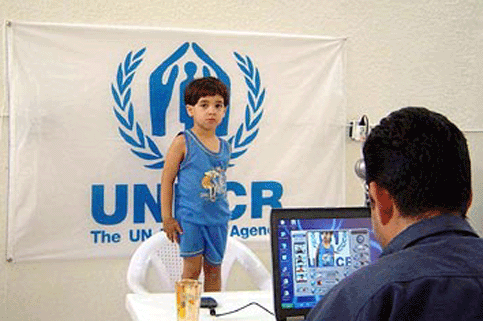United Nations High Commissioner for Refugees 17 July 2003

A Palestinian refugee boy has his picture taken at UNHCR’s registration point in Baghdad (Photo: UNHCR/M.Sunjic)
Many of the Palestinians living in the dusty tented camp in Baghdad put on their best clothes before having their identity photo taken at UNHCR’s registration point. Children, especially boys, are fascinated by the high–tech computers and digital cameras. They are mesmerised as colour pictures of their parents instantly appear on laptop screens.
Wednesday (July 16) marked the beginning of the UN refugee agency’s effort to register Iraq’s Palestinians who have been left in legal limbo and largely without aid since the collapse of the Saddam Hussein regime in April. UNHCR officials say it is vital to have the Palestinians registered to determine exactly how many are there, and to issue them with identity documents that will give them some measure of protection.
“We have to know our beneficiaries to be able to help them,” said UNHCR protection officer Hanan Hamdan, who oversees the registration.
Twelve–year–old Saeed was spellbound by the equipment and did not want to leave the registration office. As he eventually agreed to go, he announced that he wanted to be a computer engineer when he grows up.
A frail elderly woman arrived at the registration point carried by her grandsons. She insisted on coming in person after resolutely turning down UNHCR’s offer to have an ID picture taken in her tent.
The registration is eventually expected to cover up to 80,000 Palestinian refugees believed to be living in Iraq. Many of them were born here. Their parents and grandparents had fled from Palestine at various times, some as early as 1948.
The first to register on Wednesday were Palestinians living in a makeshift tented camp at central Baghdad’s Haifa Sports Club. UNHCR pitched the tents last month, after Palestinian refugees living in the Iraqi capital were expelled from their apartments.
Once housed and supported by the Iraqi regime, the Palestinians suddenly found themselves living in the street in the punishing heat of the Iraqi summer. Their landlords, who had been forced by the regime to house them in exchange for a token rent, have now showed them the door.
UNHCR estimates that more than 1,100 families have been evicted – over 4,000 individuals. About one–third of them are now in tents pitched in two soccer fields.
After a weeks–long search, UNHCR has now identified a vacant apartment block in Baghdad and secured the agreement of Iraq’s Coalition Provisional Authority to house them there. The agency is already working with local contractors to have the flats repaired so that the refugees can move as quickly as possible.